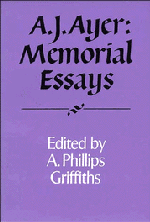Book contents
- Frontmatter
- Contents
- Preface
- A Defence of Empiricism
- Ayer: the Man, the Philosopher, the Teacher
- Ayer's Place in the History of Philosophy
- AYER'S ATTACK ON METAPHYSICS
- Ayer and World Views
- Language, Newspeak and Logic
- On the relation between Common Sense, Science and Metaphysics
- Logical Positivism and Intentionality
- Probability and the Evidence of our Senses
- Seeing Qualia and Positing the World
- Three Varieties of Knowledge
- The Importance of ‘If’
- Ayer's Ethical Theory: Emotivism or Subjectivism?
- Subjectivism and Toleration
- An Interview with A. J. Ayer
- Notes on Contributors
- References
- Index
Language, Newspeak and Logic
Published online by Cambridge University Press: 01 July 2010
- Frontmatter
- Contents
- Preface
- A Defence of Empiricism
- Ayer: the Man, the Philosopher, the Teacher
- Ayer's Place in the History of Philosophy
- AYER'S ATTACK ON METAPHYSICS
- Ayer and World Views
- Language, Newspeak and Logic
- On the relation between Common Sense, Science and Metaphysics
- Logical Positivism and Intentionality
- Probability and the Evidence of our Senses
- Seeing Qualia and Positing the World
- Three Varieties of Knowledge
- The Importance of ‘If’
- Ayer's Ethical Theory: Emotivism or Subjectivism?
- Subjectivism and Toleration
- An Interview with A. J. Ayer
- Notes on Contributors
- References
- Index
Summary
Some books are like parents, grandparents or old friends. They have been with us from our earliest days and one treats them almost with familiarity. They belong to one's youth and the recognition that they have been around for months and years keeps company with surprise. For philosophers such a book is A. J. Ayer's Language, Truth and Logic, first published over fifty years ago in 1936. There is a sense in which a similar point may be made about some individuals, but discretion and good manners should deter us from succumbing to the philosophical disease of pressing an analogy too far. Suffice it to say that over a period during which most English speaking philosophers were content (or perhaps constrained) to work within a context which was significantly influenced by Ayer's clear and cajoling formulation of a twentieth century of empiricism, F. C. Copleston provided one of the few distinctive alternative philosophical perspectives on major metaphysical questions. This essay will reflect upon the influence of Ayer's Language, Truth and Logic some fifty years after its publication, upon the philosophical discussion of religion and theological questions.
The impact of the book at the time of its publication was quite dramatic and of equal interest was its continuing success in sales terms. Ayer admits, however, that the book ‘can be accused of sacrificing depth to clarity’, {PL, 154) but in terms of wide and lasting impact clarity is a decided asset. The thoughts in the book, as Ayer agree, were not original and, ‘Reviewing this work at a distance of more than forty years, I have many faults to find with it … ’ (ibid. 155).
- Type
- Chapter
- Information
- A. J. Ayer: Memorial Essays , pp. 77 - 88Publisher: Cambridge University PressPrint publication year: 1992

